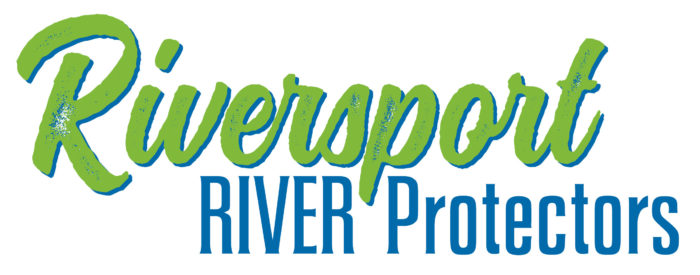RIVERSPORT River Protectors
Our thanks to all the individuals and groups who volunteer to keep our river clean! Sign up below or email us here to learn more and let us know if you’d like to join River Protectors.

RIVERSPORT River Protectors is a way to bring our collective community together as good stewards of our Oklahoma rivers and waterways.
RIVERSPORT has a passion for outdoor river adventures, recreation and sport. In 2020, we launched a new initiative to share our passion for keeping our rivers in their natural state – free of litter and trash.
The North Canadian River travels from Colorado through New Mexico into the Texas Panhandle and on to what eventually becomes the Oklahoma River. Everything thrown away upstream eventually makes it to the Oklahoma River.
RIVERSPORT River Protectors focuses on removing trash as it arrives, but more importantly, identifying and working to bring about the cultural shift that will eliminate the problem.
Worst Offenders, Opportunities to Change
The two most common forms of trash found in the river are single-use plastics such as water and soda bottles, and Styrofoam cups, plates, and to-go containers.
It’s important to move away from these single-use items that once created, are on this planet for hundreds of years. In the short term, they are killing fish, birds and sea creatures. Long term, plastic breaks down into smaller pieces with micro-plastics making their way into our oceans and our bodies. As Styrofoam degrades, it releases toxic chemicals.
the goal is to replace plastic and Styrofoam with products that are biodegradable or compostable.
River Protectors needs volunteers to help pick up the trash, and also need ask their restaurants and retailers to offer more eco-friendly alternatives than Styrofoam and plastic. It won’t happen overnight; it’s a process. RIVERSPORT is working to get there just like everyone else. It’s a journey that begins with that first step.
Get involved!
We are looking for either individuals or groups to help pick up and catalogue the trash along the river. RIVERSPORT is partnering with OKC Beautiful to complete a series of clean up events and is inviting volunteers to join the effort.
Litter pick up supplies including grabbers, buckets, nets for smaller items, biohazard containers, and coffee bean bags (rather than plastic bags) are provided via local donations from Edmond Lowes stores and Eôte’ Coffee.
Groups interested in participating in a planned clean-up event can contact RIVERSPORT at 405-552-4040 or OKC Beautiful at (405) 525-8822 to learn more. Sign up here or email us to learn more.
More Resources
“How to Properly Recycle Plastic” – https://www.wristband.com/content/how-to-properly-recycle-plastic/
Bring practical, STEM based, environmentally friendly lesson plans into your school, classroom, or home schooling curriculum. STEM Education Resources
Join TED-Ed and students around the world in understanding and helping solve the global plastic waste problem. Take the challenge!
In 2020, Oklahoma City adopted its very first sustainability plan called “Adapt OKC.” This very thorough report lays out the adjustments our community will need to move forward with into the future for a healthy sustainable Oklahoma City. Chapter 5 of the report covers waste and recycling [learn more].
In 2020, RIVERSPORT River Protectors joined one of the largest worldwide groups addressing plastic pollution in our waterways, oceans and land. The Plastic Pollution Coalition is an incredible resource of information, innovation, and inspiration.
Outdoor Industry Alliances
Werner Paddles Healthy Waters’ goal is to protect the waters we all enjoy through a love of paddle sports. Join Werner by using #healthywaters on social media when you post photos of cleaning up your local waterways.
Starboard Stand Up Paddle is the most environmentally committed paddle board company in the world. They are the tip of environmental innovation in all areas of corporate responsibility.
Learn How Plastic Harms Oklahoma’s Wildlife
By Keaton Knopp, Age 16
Basecamp Nature Center Co-Creator and RIVERSPORT Junior Crew Rower
35 million tons of plastic and plastic products are produced every year, just in the U.S. alone. Whether in the form of wrappers, bottles, bags, or cartons, it is all very harmful to the ecosystems around us. What many people seem to forget is that such a large amount of plastic has to end up somewhere, and if not recycled, plastic is detrimental to natural ecosystems. It is believed that 700 different aquatic species could go extinct due to the buildup of plastic in the world’s water waterways.
So how exactly does plastic harm Oklahoma’s wildlife? First and foremost, plastic can be fatal if ingested. When plastic ends up in Oklahoma’s waterways, many of the state’s native aquatic wildlife such as turtles and fish mistake it for food and attempt to eat it. That plastic then becomes stuck in the animal’s gut and prevents digestion. This leads to a very slow and painful death. Because it takes up to 1,000 years for plastic to break down, that plastic will continue to kill other animals in the wild. Over one million animals are killed each year globally by the buildup of plastic; this is NOT okay.
Take the spiny softshell turtle for example. Because these turtles are not very intelligent, it is easy for them to mistake a piece of plastic for algae or a small insect. The softshell will consume it and die within the week. Now think about this same process happening over and over again to hundreds of thousands of animals. Eventually, this dramatically decreases the populations of many different species simply because humans don’t bother to recycle. It is estimated that there are over one hundred MILLION tons of plastic in the world’s bodies of water right now; each small piece of that plastic can be fatal to an animal.
Ingestion is not the only issue. Plastic (and Styrofoam) have a coating made of dangerous chemicals; when exposed to water and sunlight, those chemicals melt off the trash and contaminate the water. Because fish have gills, these chemicals kill all the fish in that specific water source. Fish are a key part of many animals’ diets, so when they are gone, the fish-eating animals disappear. The death of one species causes the death of many others.
Styrofoam is also a major problem in the animal world due to the fact that it is still widely used and takes 500 years or more to decompose. The reason it affects waterways even more than terrestrial habitats is because Styrofoam releases its toxic ingredients into the ecosystem when it reacts with water. This creates a poisonous environment for everything living inside. This means that any time you use a Styrofoam cup at a gas station or get to-go boxes at a local restaurant, those unnecessary commodities can kill many animals. Those detrimental items won’t disappear until long after you are gone.
Next time you use a plastic water bottle or any other plastic appliance, think about where it could end up. Because we can’t see exactly what happens with our trash, it is hard for us to relate and therefore hard for us to act. If the world’s animals disappear, we disappear as well. It is up to us to protect what can’t protect itself. It is up to you.



